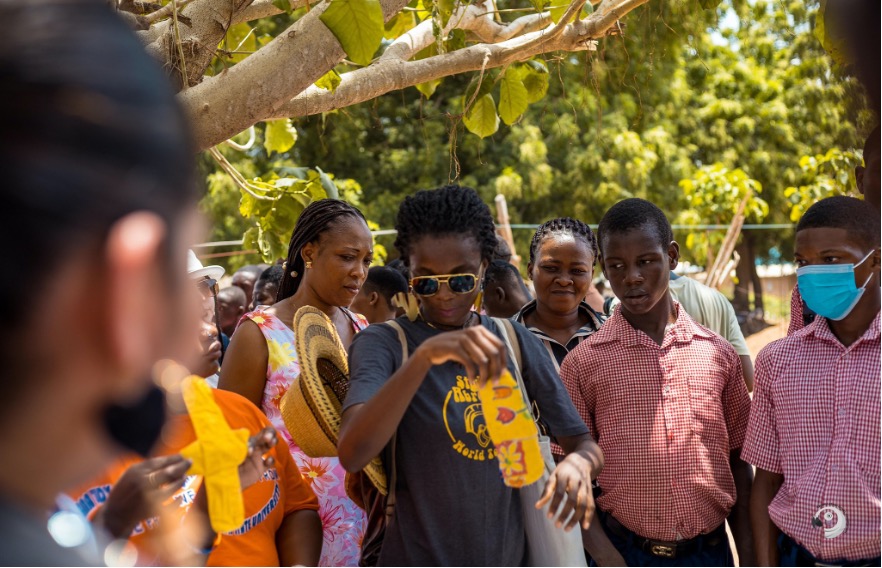
An Interprofessional Social Work Collaborative Disrupts Period Poverty in Search of Menstrual Equity
Written by Areli Padron Sanchez, Monalisa Piquero, Rachel Riojas, Karina Garcia-Aguilar, and Sevaughn Banks
Period poverty or menstrual poverty, defined as inadequate access to affordable menstrual hygiene products, remains a stigmatized global problem. Research documents when girls and young women lack menstrual products it affects their well-being and their school attendance. Therefore, education about menstrual health and hygiene is a fundamental human right for menstruating individuals. In addition, access to resources to contain menstrual bleeding when attending school while menstruating supports women’s rights. However, menstrual equity escapes many young girls and women in developing countries. According to the Global Water Security & Sanitation Partnership (2021), many women worldwide struggle with period poverty, and over 23 million girls miss school or drop out globally because they lack the financial means to afford menstrual supplies, lack adequate facilities for managing menstruation, or face taboos and stigma related to their menstrual cycle. Up to 95% of girls in Ghana miss up to 20% of their school attendance due to menstrual challenges because they cannot afford menstrual products.



Five social work students, Karina Garcia-Aguilar, Monalisa Piquero, Areli Padron Sanchez, Rachel Riojas, and Leslie Benitez, and their professor, Dr. Sevaughn Banks, from California State University, Stanislaus, in the United States visited the community of Amankwakrom, a remote island in eastern Ghana, as part of a study abroad course. They witnessed firsthand the devastation of period poverty, empathized with menstruating women, and knew could not rest until more was done for menstruating girls and women. They created the #ACTGlobalInitative to help combat period poverty. Chief Otukwa Mpareko VI, the paramount chief of the Kwahi Asabi neighborhood on the island of Amankwakrom invited the five students back and challenged them to tackle relevant issues on the island. One student, Areli Padron Sanchez, accepted the challenge and created Project Flow: Achieving Global Menstrual Equity, an interprofessional psychoeducational workshop that was co-facilitated by students from the University of Ghana, Legon and Savannah State University. The curriculum explained differences between reusable and non-reusable menstrual commodities and workshop participants practiced ways to manage menstrual bleeding with health props. During the workshop, young girls reported utilizing one reusable napkin a day if their families could afford sanitary napkins and, after the training was complete, asked for more supplies for themselves and friends. Christiana Dogbeda Ewurama Agboto, a workshop co-facilitator and registered midwife in Ghana, reported in many communities, the inability to afford menstrual products forces individuals to resort to using ineffective or unhygienic alternatives like rags, newspapers, or even leaves, which can lead to infections and other health issues. One such health issue leads to mental health challenges.




Research highlights the impact of social taboos associating menstruation with notions of being ‘dirty’ or ‘impure’. This stigma attached to menstruation amplifies the already daunting hurdles confronted by individuals grappling with period poverty, intensifying emotions of shame and isolation. This societal taboo deepens the economic and practical struggles associated with accessing menstrual products and inflicts psychological distress by fostering a culture of silence and embarrassment about a natural bodily process. As a result, those affected may feel marginalized, unseen, and hesitant to seek support or advocate for their needs, perpetuating a cycle of invisibility and disenfranchisement. Efforts to disrupt this stigma are crucial in addressing the immediate material needs of those experiencing period poverty and fostering an environment of dignity, empathy, and inclusivity, one leading to menstrual equity. In their effort to dismantle period poverty, the #ACTGlobalInitative delivered over 10,000 non-reusable sanitary napkins to Chief Otukwa Mpareko VI to distribute amongst schools in hopes of increasing awareness of menstrual wellbeing, reducing negative health outcomes, and increasing school attendance.
To address period poverty and menstrual equity effectively and sustainably and reduce the environmental impact of menstrual waste, a multi-systemic approach is the best. Local indigenous support is crucial! A local feminist rapper, Gyaldemtish, who embraces menstrual equity added her expertise and gave legitimacy to this important issue. Another important contributor, Amdiya Abdul Latiff, the Founder and CEO of EcoPeriod, a company that produces reusable and sustainable sanitary pads distributed them and now seeks collaborators. In addition, tribal, state, and national policymakers must promote sustainable menstrual products and improve access to basic sanitation and hand-washing facilities to maintain menstrual health and hygiene. By identifying the correct levers to enhance the uptake of modern period products, including sustainable alternatives, collaborators can help women and girls manage their menstrual hygiene needs with comfort and dignity. As social workers, we must promote global core values like social justice and dignity and worth of individuals. An interprofessional multi-systemic approach to menstrual equity elevates women’s rights, and women’s rights are human rights issues.
The photos on page 4 represent the evolution of the reusable and sustainable sanitary napkin.
| 1st GENERATION sanitary napkins – 2023 and before These sanitary pads are made of cotton. Individuals can put tissue or paper in them to attempt to absorb blood. |  |
| 2nd GENERATION sanitary napkins – 2023 and after These sanitary pads are made of cotton. The innovation was including towels in the center. The face towels are used to attempt to absorb blood. |  |
| 3rd GENERATION sanitary napkins – 2024 Amdiya Abdul Latiff, the Founder and CEO of EcoPeriod created this eco-friendly biodegradable sanitary pad that uses organic absorbent fabric. |  |
Reference
Global Water Security & Sanitation Partnership. (2021). Menstrual Health and Hygiene Resource Package. The World Bank, 1 – 20.
Use the form below to subscibe to Owia Bulletin.
Discover more from Africa Social Work & Development Network | Mtandao waKazi zaJamii naMaendeleo waAfrika
Subscribe to get the latest posts sent to your email.



You must be logged in to post a comment.